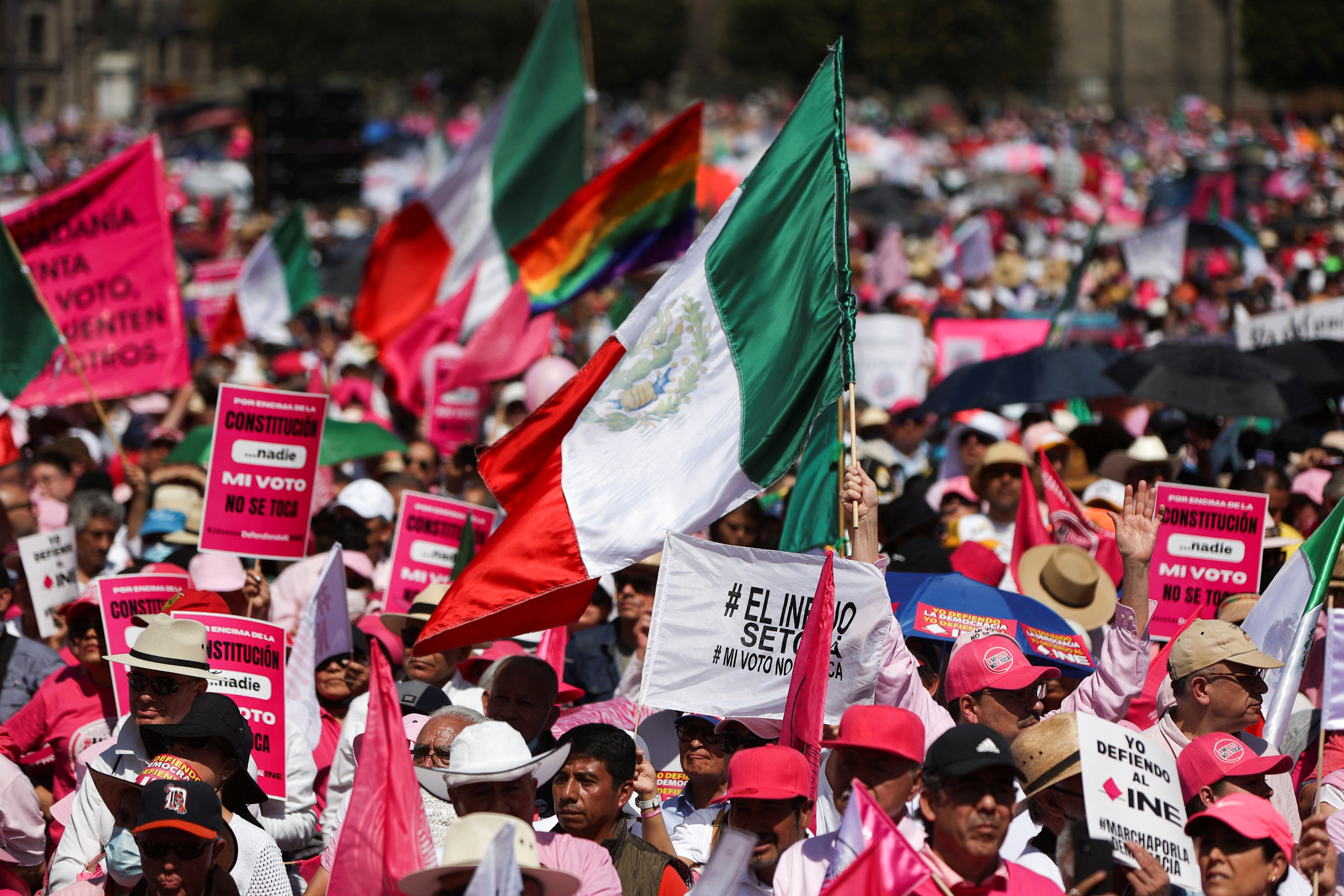Are you curious about Who Won The Mexico Presidency in the recent elections? At gaymexico.net, we understand the importance of staying informed about key political events, especially those that impact the LGBTQ+ community and the broader social landscape in Mexico. This article will delve into the details of the election results and explore what they mean for the future. Let’s explore the election results, the candidates, and the potential implications for the LGBTQ+ community in Mexico, all while providing a queer-friendly perspective.
1. Who Secured the Mexican Presidential Seat in 2024?
Claudia Sheinbaum emerged victorious in the 2024 Mexican presidential election. Sheinbaum, representing the Morena party, secured a significant win, marking a historic moment as Mexico’s first female president. This victory signifies a continuation of the political project initiated by her predecessor, Andrés Manuel López Obrador, often referred to as the “Fourth Transformation.”
What were the key factors contributing to Claudia Sheinbaum’s victory?
Several factors contributed to Sheinbaum’s success, including her alignment with the popular outgoing president, López Obrador, and the Morena party’s strong base of support. Her campaign focused on continuing López Obrador’s social programs and addressing issues such as inequality and poverty. Moreover, the fragmentation of the opposition vote likely played a role in consolidating Morena’s victory.
What challenges and opportunities does Sheinbaum face as she assumes the presidency?
As president, Sheinbaum faces significant challenges, including addressing organized crime, combating violence against women, and navigating complex relationships with international partners. However, she also has opportunities to advance social justice, promote sustainable development, and strengthen Mexico’s democratic institutions. Her ability to unite the country and address these pressing issues will be crucial for her success.
 Claudia Sheinbaum
Claudia Sheinbaum
2. What Was the Voter Turnout in the 2024 Mexican Presidential Election?
Over 60 million Mexican voters participated in the June 2nd elections, demonstrating a strong engagement in the democratic process. This substantial turnout reflects the significance of the elections, which included not only the presidential race but also contests for congressional seats, governorships, state legislators, and municipal offices.
How does the 2024 turnout compare to previous Mexican elections?
The 2024 election saw a robust voter turnout, indicative of the high stakes and public interest in the political direction of the country. While precise comparative data requires further analysis, the participation rate suggests a continued trend of active civic engagement in Mexican elections.
What factors influenced voter turnout in the 2024 election?
Several factors likely influenced voter turnout, including the historic nature of the election with the potential of electing Mexico’s first female president, the intense political debates surrounding the future of López Obrador’s “Fourth Transformation,” and the efforts of various political parties to mobilize their supporters. Additionally, concerns about security and organized crime may have motivated citizens to participate in shaping their government.
3. How Does Claudia Sheinbaum’s Victory Impact the LGBTQ+ Community in Mexico?
Claudia Sheinbaum’s election as Mexico’s first female president carries significant implications for the LGBTQ+ community. As a progressive leader, she has expressed support for LGBTQ+ rights and has a track record of implementing inclusive policies during her tenure as Mayor of Mexico City.
What specific policies has Sheinbaum supported that benefit the LGBTQ+ community?
During her time as Mayor, Sheinbaum implemented policies such as legalizing same-sex marriage, expanding access to healthcare for transgender individuals, and promoting LGBTQ+ inclusive education in schools. These actions demonstrate her commitment to advancing equality and protecting the rights of LGBTQ+ individuals.
What are the potential challenges and opportunities for LGBTQ+ rights under Sheinbaum’s presidency?
Despite Sheinbaum’s progressive stance, challenges remain in advancing LGBTQ+ rights across Mexico. Social stigma, discrimination, and violence against LGBTQ+ individuals persist in many parts of the country. However, her presidency presents an opportunity to implement national policies that protect LGBTQ+ rights, promote inclusivity, and combat discrimination. Working with LGBTQ+ organizations and activists will be crucial to ensure that these policies are effective and address the specific needs of the community.
4. What is “Fourth Transformation” and How Will Sheinbaum Continue This Initiative?
The “Fourth Transformation” (Spanish: Cuarta Transformación or 4T) is a political project initiated by outgoing President Andrés Manuel López Obrador. It seeks to reshape Mexico’s social, economic, and political landscape, with a focus on empowering the poor and marginalized, combating corruption, and strengthening national sovereignty.
What are the key components of López Obrador’s “Fourth Transformation?”
The key components of the 4T include:
- Social Programs: Expanding access to social welfare programs, such as cash transfers for the elderly, students, and people with disabilities.
- Anti-Corruption Measures: Implementing policies to combat corruption and promote transparency in government.
- National Sovereignty: Asserting Mexico’s independence and autonomy in international relations.
- Infrastructure Development: Investing in infrastructure projects, such as the Mayan Train and the Dos Bocas refinery.
How will Sheinbaum continue and potentially modify the “Fourth Transformation” agenda?
Sheinbaum has pledged to continue the 4T, but she may also introduce her own priorities and modifications. While she shares López Obrador’s commitment to social justice and anti-corruption, she may adopt a more technocratic approach and prioritize issues such as climate change and sustainable development. Her ability to balance continuity with innovation will be essential to her success.
5. How Did Organized Crime Influence the 2024 Mexican Elections?
Organized crime played a disturbing role in the 2024 Mexican elections, marking a concerning trend of violence and intimidation in the democratic process. Criminal groups exerted influence through assassinations, bribery, and threats, impacting both candidates and voters.
What specific acts of violence and intimidation were reported during the election cycle?
The election cycle saw a record number of attacks against politicians, including murders of candidates and likely contenders for office. According to the Electoral Laboratory, there were 320 documented attacks, including 93 murders, surpassing previous election years. These acts of violence were concentrated in states with high levels of organized crime activity.
What measures can be taken to mitigate the influence of organized crime in future elections?
Mitigating the influence of organized crime in future elections requires a multi-faceted approach, including strengthening law enforcement, enhancing security for candidates and voters, promoting transparency in campaign finance, and addressing the root causes of crime and violence. International cooperation and support from civil society organizations are also crucial to combatting organized crime and protecting Mexico’s democracy.
 Mexican Election
Mexican Election
6. What Constitutional Reforms Were Proposed by López Obrador and How Will Sheinbaum Handle Them?
Outgoing President López Obrador proposed 20 major reforms, including 18 that require constitutional changes, covering a wide range of issues from healthcare and pensions to institutional design. These reforms have sparked debate and controversy, particularly those that seek to eliminate proportional representation in Congress, dissolve regulatory agencies, and transfer control of the National Guard to the military.
What are the most contentious proposed constitutional reforms?
The most contentious reforms include:
- Elimination of proportional representation in Congress: Critics argue this would reduce political diversity and weaken opposition parties.
- Dissolution or restructuring of regulatory agencies: Concerns have been raised about the potential for increased government control and reduced accountability.
- Transfer of the National Guard to the military: Civil society organizations worry this would further militarize public security and undermine human rights.
- Popular election of Supreme Court justices: Legal experts caution this could politicize the judiciary and compromise its independence.
How will Sheinbaum navigate these proposed reforms and balance continuity with her own agenda?
Sheinbaum’s approach to these reforms will be a defining moment in her presidency. While she is expected to consult with López Obrador, she will also need to consider the potential impacts of these reforms on Mexico’s democracy, economy, and social fabric. Finding a balance between honoring López Obrador’s legacy and asserting her own vision will be crucial for her leadership.
7. What is the Significance of Mexico Having Its First Female President?
The election of Claudia Sheinbaum as Mexico’s first female president is a historic milestone with profound social and political implications. It represents a major step forward for gender equality and women’s empowerment in a country where women have historically been underrepresented in positions of power.
How does Sheinbaum’s election reflect progress in gender equality in Mexico?
Sheinbaum’s election is a testament to the progress Mexico has made in recent decades in promoting gender equality. Parity laws and increased awareness of gender issues have led to greater representation of women in politics and other spheres of public life. Her victory is a powerful symbol of what women can achieve and will inspire future generations of female leaders.
What challenges remain for women in Mexico despite this historic achievement?
Despite this historic achievement, significant challenges remain for women in Mexico. Violence against women, including femicide, remains a serious problem. According to UN Women, between nine and ten women are murdered every day in Mexico. Other challenges include gender-based discrimination in the workplace, unequal pay, and limited access to education and healthcare in some regions.
8. How Does Mexico’s Political Landscape Affect the LGBTQ+ Community?
Mexico’s political landscape significantly impacts the LGBTQ+ community, with advancements in rights and protections often varying across different states and regions. While some areas have embraced progressive legislation, others continue to lag behind, resulting in disparities in access to marriage equality, adoption rights, and protection from discrimination.
What are the current legal protections and challenges for LGBTQ+ individuals in Mexico?
Same-sex marriage is legal in all Mexican states, a significant victory achieved through court rulings and legislative reforms. However, challenges persist in areas such as transgender rights, access to healthcare, and protection from hate crimes. Discrimination based on sexual orientation and gender identity remains a concern in many parts of the country.
How can the LGBTQ+ community advocate for further progress in the current political climate?
Advocating for further progress requires a multi-pronged approach, including engaging with political leaders, building alliances with civil society organizations, raising awareness through education and advocacy campaigns, and challenging discriminatory laws and practices through legal channels. The LGBTQ+ community must also work to ensure that their voices are heard in the political process and that their rights are protected and promoted.
9. What Opportunities Exist for LGBTQ+ Tourism in Mexico Under the New Leadership?
Mexico has become an increasingly popular destination for LGBTQ+ tourists, drawn to its vibrant culture, beautiful beaches, and welcoming atmosphere in many cities and resort areas. The new leadership has the opportunity to further promote LGBTQ+ tourism by implementing inclusive policies, supporting LGBTQ+ owned businesses, and ensuring the safety and well-being of LGBTQ+ visitors.
Which destinations in Mexico are particularly welcoming to LGBTQ+ travelers?
Popular LGBTQ+ destinations in Mexico include:
| Destination | Highlights |
|---|---|
| Puerto Vallarta | Known for its vibrant gay scene, beautiful beaches, and welcoming atmosphere. |
| Mexico City | Offers a diverse cultural scene, thriving nightlife, and LGBTQ+ friendly neighborhoods. |
| Cancun | A popular resort destination with LGBTQ+ friendly hotels and beaches. |
| San Miguel de Allende | A charming colonial town with a growing LGBTQ+ community. |
What steps can be taken to ensure a safe and welcoming experience for LGBTQ+ tourists in Mexico?
Ensuring a safe and welcoming experience for LGBTQ+ tourists requires collaboration between government agencies, tourism businesses, and LGBTQ+ organizations. This includes training tourism staff on LGBTQ+ sensitivity, promoting LGBTQ+ friendly accommodations and activities, and implementing measures to prevent discrimination and violence against LGBTQ+ visitors.
Remember to visit gaymexico.net for resources.
10. How Can I Stay Informed About LGBTQ+ Issues and Events in Mexico?
Staying informed about LGBTQ+ issues and events in Mexico is essential for anyone interested in supporting the community and promoting equality. There are many ways to stay connected and informed, including following LGBTQ+ organizations on social media, subscribing to newsletters, and attending events and conferences.
What are some reliable sources of information about LGBTQ+ issues in Mexico?
Reliable sources of information include:
- LGBTQ+ organizations: Organizations like All Out are great sources.
- News outlets: Reputable news sources that cover LGBTQ+ issues in Mexico.
- Academic research: Studies and reports on LGBTQ+ issues from universities and research institutions.
How can I support LGBTQ+ organizations and initiatives in Mexico?
There are many ways to support LGBTQ+ organizations and initiatives in Mexico, including:
- Donating to LGBTQ+ organizations.
- Volunteering your time and skills.
- Raising awareness about LGBTQ+ issues.
- Advocating for LGBTQ+ rights.
For additional resources and information about LGBTQ+ travel and community in Mexico, be sure to visit gaymexico.net.
 gaymexico.net
gaymexico.net
In conclusion, the 2024 Mexican presidential election marks a significant moment in the country’s history, with Claudia Sheinbaum’s victory opening new possibilities for progressive policies and social change. As we move forward, it is crucial to stay informed, engaged, and supportive of efforts to promote equality, justice, and inclusivity for all Mexicans, including the LGBTQ+ community.
FAQ: Mexican Presidential Election 2024
1. Who was the winning candidate in the Mexico presidential election?
Claudia Sheinbaum won the Mexico presidential election.
2. What political party does the current president of Mexico represent?
Claudia Sheinbaum represents the Morena party.
3. How will the new president affect LGBTQ+ rights in Mexico?
Claudia Sheinbaum has a supportive stance on LGBTQ+ rights, which could lead to advancements in equality and inclusivity through national policies.
4. What was the voter turnout in the Mexico presidential election?
Over 60 million Mexican voters participated in the elections.
5. What were the key issues in the Mexican presidential election?
Key issues included social programs, anti-corruption measures, national sovereignty, and infrastructure development.
6. How did organized crime affect the election outcome?
Organized crime influenced the elections through violence and intimidation, impacting candidates and voters.
7. What destinations are most welcoming for LGBTQ+ travelers in Mexico?
Destinations like Puerto Vallarta and Mexico City are known for being particularly welcoming to LGBTQ+ travelers.
8. How can LGBTQ+ tourists stay safe while visiting Mexico?
LGBTQ+ tourists can ensure their safety by staying informed, using reputable services, and being aware of local customs.
9. What are the reliable sources to learn more about LGBTQ+ issues in Mexico?
Reliable sources include LGBTQ+ organizations like All Out, reputable news outlets, and academic research institutions.
10. What actions can I take to support LGBTQ+ individuals in Mexico?
You can support LGBTQ+ individuals by donating to organizations, volunteering, raising awareness, and advocating for LGBTQ+ rights.
For more in-depth information and resources, don’t forget to visit gaymexico.net.
